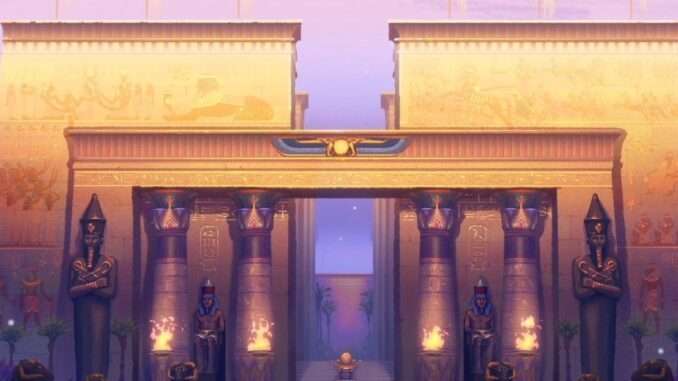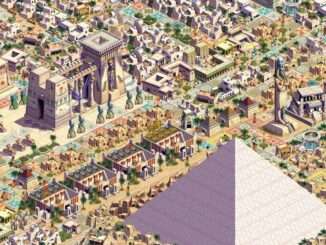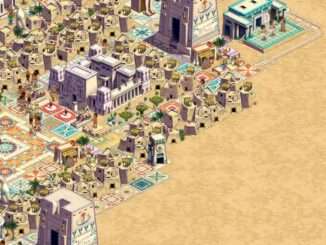
I played a lot of the old Pharaoh and I am playing through this one as well. I’ll share some tips to start missions the right way.
Tips and Tricks
Pause the Game
- I suspect most players know this already, but you can pause Pharaoh: A New Era. Simply hit the pause button in the upper left corner of the screen or tap the Spacebar on your keyboard.
- I typically play at 5x speed (and I wish there was a 10x speed), but as soon as a situation arises, I pause the game and address it.
- Pausing is especially useful when building a Storage Yard, to keep any mischievous delivery man to put his load in and take valuable space with his unwanted straw merchandise.
- Note: Straw is useful in some missions, but not in others, yet you can’t turn off the production of Straw like you could in the old game. What a waste.
- By default, the game doesn’t pause when you open any of the Overseer panels. You can change this in the options.
Study the Maps and Find a Profitable Resource
Both your city map and the Worldmap are important. When I start a new mission, I pause the game and look around for resources (stones, reeds, fertile lands, etc.) and I double-check with the available buildings under the Food & Farming and Production categories (this is when you find out you don’t have Clay Pits and weep. I’ll wait.).
Then, I check the Worldmap and try to find a city that buys the resources I already have. I open those trade routes right away.
Example 1:
Your neighbour buys clay. Marvellous, easy money. Build 4 Clay Pits and sell their whole production until you are stable enough to move to more profitable resources.
Example 2:
Your neighbour buys potteries. Even better, since 100 units of Pottery sell for 3 times as much as 100 units of Clay. I can see the money rolling in right now.
Example 3:
Your neighbour buys Beer, but you don’t have Barley. But another neighbour (let’s call them A and B, respectively) sells Barley (and Beer, but forget buying to sell, it’s not profitable). Buy Neighbour B’s Barley, transform it into Beer and sell it to Neighbour A. It will double your investment. It costs a bit much to open two trade routes at once, but you’ll do fine. You should prioritise selling your own resources without importing the raw material when you can, but this method is still profitable.
Build Dedicated Storage Yards
You might think combining both raw and finished resource into one Storage Yard might be a good thing, but it isn’t. I advocate for dedicating each Storage Yard to only 1 resource. Remember that mischievous delivery man from earlier? He can get stuck sometimes (at a Ferry Landing, let’s say) and he can’t be delivering that raw resource that your productive workers need, which slows down the whole system. Build two Storage yards as near to their associate Production buildings as you can.
About Docks
A great innovation of Pharaoh: A New Era! Docks can be restricted to handling only a few resources. Very useful to keep that mischievous delivery man who works at the Dock by the Stone Quarry from fetching Linen at the other end of the map and slowing down your profit.
Place the Monuments Right Away
Even if you don’t have the money to import costly Plain Stones blocks for that bent pyramid (you know the one I am talking about), you should still put down the monument somewhere on your map. This is mainly to prevent you from overextending your city so much that you don’t have space for that monument. Some monuments require access to a waterway, which can be quite a nightmare if you didn’t think it through (ask me how I know this).
Also remember that monuments need to be connected to a road in order to start construction. That can be a handy way to prioritising one monument over another while having both placed on the map already.
Keep Population Low
Even if you have all the imaginable resources available to you, you don’t need to raise your houses as high as they can go (or at least, not right away). Start with a humble neighbourhood (Water Supply, Physician, Apothecary, Firehouse, Architect’s Post, Police Station, Temples), and start producing that valuable product that you can sell. You can plan ahead regarding Performance Venues (such as leaving an empty space when two roads intersect), just don’t build those yet since they require workmen (unless your unemployed workforce is incredibly high, but you know the meaning of “humble”, don’t you?).
Houses can survive without food, just make sure their Hygiene needs are met. And Firehouses. Never forget the Firehouse, or you’ll find yourself reenacting the Great Fire of London of 1666.
Once you make a yearly profit, upgrade your housing by 1 or 2 levels, enough to raise your unemployed workforce to around 10%, and start on another valuable venture by again looking at the Worldmap, opening a new trading route and building the appropriate buildings.
The Culture rating needed to successfully complete a mission is rarely as high as the mission introduction makes it sound. The pharaoh wants libraries? Great, but my people don’t need it and I win regardless, so I’m saving myself some pain. You should do the same.
I often build multiple separate Housing areas. You can should limit what the Bazaars are buying to just what you need to house your people comfortably. No need for Linens or Jewels for a good long while. The Pharaoh might still request those resources from you. He can be a b*tch, sometimes, but you’re selling your extras, right? So it’s fine!
Change the Difficulty Setting, If You Need to
I’m not going to say your playing experience is not valid if you didn’t play on the hardest difficulty, because who wants that amount of pain? By default, the game starts with the difficulty setting at ‘Normal’ (open the Settings either on the Home menu or in-game to change it). You can change the difficulty in the middle of a mission, if you find yourself confronted with a very angry Seth that wants to level your whole city.
I like playing at ‘Normal’, that gives me time to read while I wait 100 years for that pyramid to complete (and Methuselah dies on me!). I learned how to play on ‘Very Easy’ (way back when, it’s not longer available), then progressively increased the difficulty. Maybe I could successfully play on ‘Hard’, but I get a kick when I finish a mission with more than 100,000 Debens in my coffers.





Population management is pretty important to keep your unemployment percentage low (3-5% seems ideal). You can control the population using taxation and by adjusting wages through the overseer of the treasury. If unemployment get higher your population gets uppity and abandons you. You want them moderately happy with you.
Also, especially on hard, using your political overseer to give gifts to the people helps boost your kingdom rating quickly. You have to use your personal savings though.
Very nice guide to new players, it’s really adequated for them and for old players too, still are people who doesn’t know certain things of the game. 24 years after, we finally have the remake (full of bugs and issues), it’s the most entertaining game I’ve player in my live along with AoE. Congratulations Thia! If I remember something I will comment.
One good tip you might like to share is that the jugglers, dancers and musicians that walk from the schools to the stages also service houses. You can take advantage of this by placing stages on one side of your houses and the schools on the other so the shortest path for the walkers goes right past your houses.This way you don’t need to put intersections in your housing blocks, making services more reliable.
building around 10 shrines to each god should make them congenial throughout the mission
I am playing this for the first time in many years, and previously never played it seriously. Now that I’m older I want to go through the missions. I find myself in debt quickly and in early missions, The goals along the way restrict me to growing my housing or focusing on a particular resource, and not having access to others, yet. I can’t open world map for trade. I think this short guide helps even early on. Dedicating storage for certain goods and proper neighborhood layouts are a good start.
I know the mission you are talking about. I don’t like the early missions where we don’t have access to trading, but put the difficulty on Easy and power through it to get to the good ones. Good luck!
great tutorial, i doesn’t know about the build seperating storages before 😀
I learned this tip quite recently (maybe 10 years ago, the last time I played the original Pharaoh), but I wouldn’t go to sharing Storage Yards for the world.